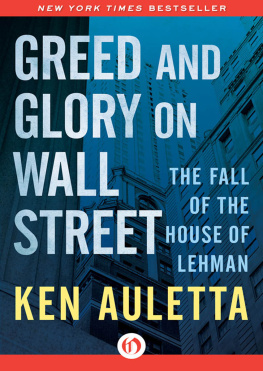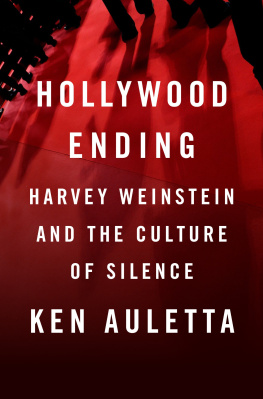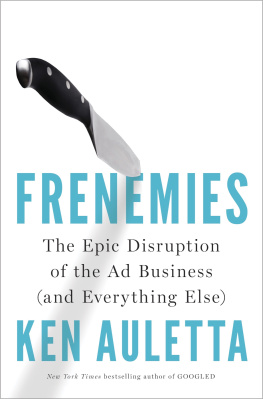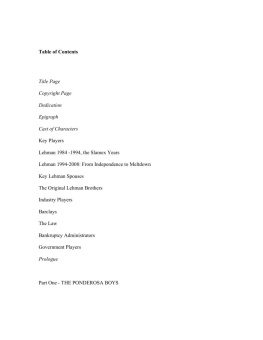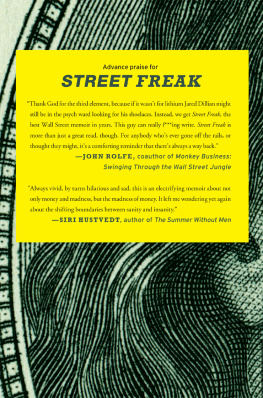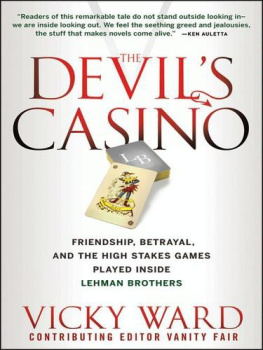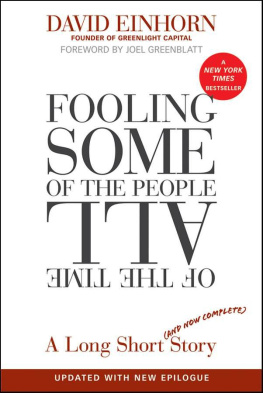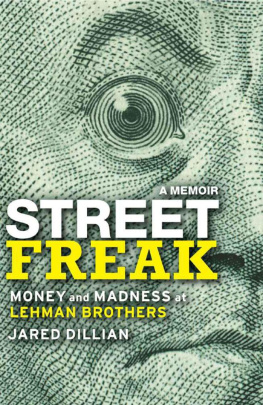Greed and Glory on Wall Street
The Fall of the House of Lehman
Ken Auletta

T O M Y P ARENTS ,
A ND R ICHARD A ND B ONNIE
For years the resentments had been building. And now, at a luncheon at the Equitable Life Assurance Society on July 12, 1983, they began to erupt within Lewis L. Glucksman, the co-chief executive officer of Lehman Brothers Kuhn Loeb. That a short, rumpled man with the face of a Russian general, whose shirt pocket often bristled with pens, who wore garish ties and short socks that slipped to his ankles, who was disparaged by Wall Street bluebloods as a lowly traderthat he would try to oust Peter G. Peterson, his imperious co-chief executive officer and the chairman of the venerable investment banking house, astonished his partners at Lehman and all of Wall Street.
In contrast to the unpolished Glucksman, Pete Peterson possessed an imposing rsum: summa cum laude graduate from Northwestern University, president of Bell & Howell at thirty-four, Secretary of Commerce in the Nixon Administration, and the man credited with rescuing Lehman Brothers from collapse in 1973 when he assumed command and with having helped steer it to five consecutive profit-breaking years. Just eight weeks earlier, in what Peterson considered a magnanimous act, he had elevated the relatively unknown Glucksman to co-chief executive officer. Lehman partners applauded.
The fallout from the explosion triggered by this July luncheon lifted this story from the business pages to the front pages. Thirteen days later, Peterson would be forced out of Lehman. Within nine months, Wall Streets oldest continuing investment banking partnership, a firm that had survived for one hundred and thirty-four years, would collapse under Lewis Glucksmans stewardship and would be sold to Shearson/American Express.
At the time of the Equitable lunch, Lehman Brothers was more profitable than it had ever been in its long history, averaging $15 million a month in pre-tax and pre-bonus profits over the preceding twelve months. With capital of almost $250 million and equity of $175 million, Lehman ranked as one of Wall Streets powerhouse investment banking houses. Unlike dozens of old-line firms that had already succumbed to the pressures of consolidation that have been reshaping Wall StreetBlyth, Eastman, Dillon; Loeb Rhoades; Hayden Stone; Hornblower & Weeks; White, Weld; Kuhn Loeb, for exampleLehman had rebounded strongly from its travails of the early seventies. Business was so brisk that projections for fiscal 1983, which would end on September 30, once again promised to shatter all previous records.
The modern melodrama that resulted from this lunch is a many-sided tale. It is a story about the life and the death of Lehman Brothers, and one of irreconcilable conflict between two men. It is a story of a poisoned partnership; of cowardice, intrigue and deceit. It is a story of greed for money, power and glory. It is a reminder that human folly and foiblesnot the bottom line of profits, not business acumen, not scientific management or the perfect marketing plans or executionoften determine the success or failure of an organization. In its broader implications, the fall of the House of Lehman opens a window onto the forces that are reshaping Wall Street and the American economic system.
Capital is a larger number because it includes the firms subordinated debts, including debts to departed partners, who will be paid over a period of time.
The story begins on July 12, 1983. John B. Carter, President and chief executive officer of the Equitable Life Assurance Society of the United States, the nations third-largest life insurer, had invited Pete Peterson to lunch in the private Hyde Room at Equitables corporate headquarters thirty-eight floors above the Avenue of the Americas and West 51st Street. Peterson invited Glucksman to join him. This was not done grudgingly. On a professional level Peterson knew he needed Glucksman. For three years, Glucksman had managed the day-to-day business of the firm; all of the departments reported to him, and his knowledge of Lehmans affairs was vast. Moreover, Peterson had an agenda for the lunch and he wanted Glucksmans cooperation to carry it out. And on a personal level Peterson enjoyed taking credit for producing what he called a new, a tamer Lew Glucksman. It was undeniably true that after almost twenty-one years at Lehman, Glucksman had become a calmer, less volcanic executive; he had shed about seventy pounds and improved a wardrobe once dominated by light suits and wide ties.
Peterson knew that Equitable and Lehman had engaged in a modest amount of business together. Lehman Brothers, like other investment bankers, served as an intermediary, matching wealth with ideas, those who needed capital with those who accumulated it. The choices the firm offered clients were broad: Lehman could midwife companies wanting to merge, proffer financial advice to avert or spur takeovers, advise local governments and countries, assist managers wishing to take their companies private by arranging so-called leveraged buyouts or by divesting unwanted divisions, help underwrite and sell corporate and government bonds, manage pension and money funds, trade various securities, gamble their own monies on stock hunches, speculate in the rise or fall of interest rates. For an investment banker, the fees and profits from these transactions were immense. In a private partnership like Lehman, the wealth of the firm was owned by the partners, who variously claimed from 500 to 4,500 shares of common stock apiece. Together with the preferred stock, the average partners equity totaled $2.3 million in the fall of 1983. Partners were paid salaries ranging from $100,000 to $150,000,
Peterson drove his executives hard before each business meeting, demanding detailed information about the companies they wished to do business with and the key executives who would be involved. He insisted on strategy sessions, detailed memoranda, marketing plans. The Equitable luncheon was no different. Even this casual luncheon demanded a series of parleys. Lehman strategists became conversant with that piece of Equitables $53 billion worth of assets then under management by various investment banks, including Lehman, and Equitables $30 billion in pension assets, of which Lehman also handled a share. They war-gamed new ideas to broach with Equitable. For years Peterson had been pressing his partners to go beyond their normal advisory role, a role in which Lehmans income was derived mostly from fees, to go beyond their underwriting and other trading functions, where profits were often hostage to an uncertain market or to fluctuating interest rates and to shrinking profit margins in a deregulated environment where customers shopped for the cheapest fees. Instead of serving simply as an intermediary or risking its capital to accommodate important clients, Peterson was pushing his partners to risk more of their own capital on new business ventures, on leveraged buyouts, in real estate ventures where there might be no ceiling on earnings. This was the kind of merchant banking practiced by Lehman Brothers for much of its then one-hundred-and-thirty-three-year-old history, the kind of risk-taking that once financed the railroads that linked the new American nation or gave birth to the airlines that shrank the globe. If Lehman could advise an average of seventy-five large corporations a year on mergers and acquisitions, why couldnt it tap its own capital to purchase a major interest in a company? The risks were greater but so were the rewards, as Equitable and Allen & Company and Odyssey Partners and several of Lehmans major competitors, including First Boston, had already demonstrated.

